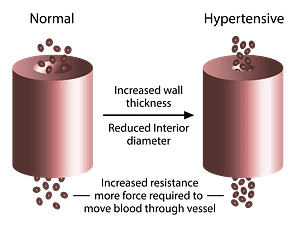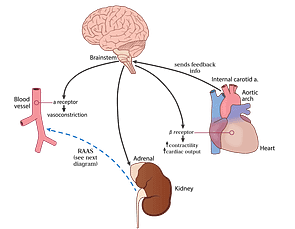The Role of the Central Nervous System on Cardiovascular Function
Blood pressure is determined by the force of blood against the blood vessel as it circulates through your body. Even though it is natural for blood pressure to adapt dynamically throughout the day, it becomes problematic when it stays too high for a long time.
The central nervous system plays a key role in regulating cardiovascular function. Increased activity of the sympathetic nervous system can affect the blood vessels and the hormonal system, resulting in elevated blood pressure [2]. A researcher from the Department of Neuroscience at the University of Pittsburgh, Sved AF, stated that alterations in the central neural mechanisms that control blood pressure may underlie the vast majority of cases of primary hypertension. It seems to be clear that the neurogenic hypertension is mediated by increased excitatory drive in the brainstem region right below the skull.
A non-invasive and drug-free procedure, called NUCCA, has been shown to significantly reduce blood pressure in patients with hypertension, according to an exciting study published in the Journal of Human Hypertension. According to Dr. Thad Vuagniaux, Co-Founder of the Upper Cervical Health Centers, “the brain and brainstem play a vital role in regulating the blood pressure. In order to have normal blood pressure, you must have proper communication between the brain and the body. When a misalignment occurs at the top of the neck near the level of the brainstem, brain to body communication is affected which may result in high blood pressure.”
How Does Realigning Upper Cervical Complex Can Help?
The Atlas vertebra, which is at the top of the neck, is not anchored like the other bones in the spine. It relies solely on soft tissue (muscles and ligaments) to stay in place, which makes it vulnerable to misalignment. In many patients, the Atlas can become displaced or misaligned without pain and therefore, often goes undetected and untreated.
When a gentle and non-invasive upper cervical correction is made and the Atlas is properly repositioned, brain to body communication is restored and the body begins to heal itself. George Bakris, MD, tells WebMD, that NUCCA procedure has the effect of not one, but two blood-pressure medications given in combination. Then Dr. Bakris added, “It seems to be adverse-event free. We saw no side effects and no problems. We were shocked to find out that we got more than double what we expected in blood pressure reduction.”
In the interview with WebMD, Dr. Bakris said, “It is pretty clear that some kind of head or neck trauma early in life is related to this.”






